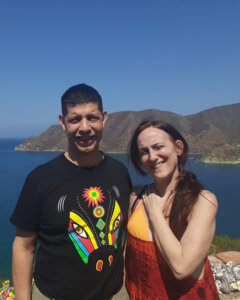The first $100,000 is the hardest to save for newcomers
Forced to become an entrepreneur, Alain Guillot forged an unconventional career as a financial pundit in Canada as an immigrant.
Advertisement
Forced to become an entrepreneur, Alain Guillot forged an unconventional career as a financial pundit in Canada as an immigrant.

Immigration has become a contentious political issue in both the United States and Canada in recent years. A big reason is the perception that newcomers to these countries are competing for jobs and driving up the cost of housing. The re-election of Donald J. Trump is almost certain to make this an even more relevant issue.
As I am myself the child of British immigrants, I am naturally sympathetic to those brave or desperate enough to leave their homes to find opportunities in North America. Which is one reason that over the past year, I’ve been corresponding with an interesting blogger and former financial advisor, Alain Guillot. He occasionally republishes his blog posts on my site Findependence Hub. His own blog is called simply AlainGuillot.com.
Guillot writes at least one blog post a week and has 600 subscribers on his YouTube channel. He recently wrote a short e-book entitled The Wealth Paradox: Navigating Money, Free will, and Success (self-published, 2024). Its subtitle explains more: “How unconventional thinking influences your financial and personal life.”
Guillot first got my attention when I learned that he emigrated to Canada from Colombia, a place I once visited. He felt he had little choice but to become an entrepreneur here, although chapter five of his e-book is titled “Entrepreneurs are mentally unstable people.” He wrote that the intention of the director of the movie Wall Street was to show the greed and ills of capitalism. However, it “had the opposite effect: more people were drawn towards investment banking. In my chapter about entrepreneurs being mentally unstable people, I had a bit of the same reverse-psychology intentions. I trash-talked the mental state of entrepreneurs as a backhand compliment and admiration for what they do.”
If that’s not unconventional enough for you, know that he is a big believer in self-insurance (putting money away for rainy days), as opposed to owning speculative assets like gold and crypto, and makes the case that the first $100,000 of wealth is the hardest to accumulate.

Initially Guillot tried various side hustles in Canada. He was a salsa and tango instructor, a photographer and a professional wedding witness. Actually, he still dabbles in each of those. He wanted to become a financial advisor in Canada, but he felt he could only do justice to clients by being a fee-for-service planner, and he learned it was hard to make a business case out of that model. Next he positioned himself as a personal finance coach, but ultimately stopped because he discovered “no one wants to listen.”
Still, he’s personally obsessed with money, so he’s trying to make a go out of blogging about personal finance and releasing video podcasts about it.
In an extended email interview, Guillot says he left Colombia because he wanted to have more opportunities. If you’re fortunate enough to be born in Canada or the United States, he says to count your blessings: “I was greatly influenced by movies, where I often saw regular families owning a house, having a car and enjoying their disposable income. They could go to restaurants, have a few drinks in a cool bar and go on vacation at least once a year. For me, in Colombia, that was a fictional world. In my environment, people were always struggling with scarcity and poverty.”
Intent on finding a wealthier country, he considered Spain, England, Australia, the U.S. and Canada. He preferred North America, since it’s in the same time zone as Colombia, making communication with his family easier. “In the end, I chose Canada over the U.S. because I believed immigration to Canada would be easier. I settled on Quebec, because I was curious about learning French as well as English.”
Guillot had two dreams for his new life, which began in Montreal in 1998:
He did become a financial advisor but was soon disillusioned upon discovering the industry is “riddled with conflicts of interest … I was unable to sell financial products to my clients because most products had exorbitant high management fees.”
Then he quit that job and started his blog in hopes of transitioning to becoming a fee-only financial advisor. “Unfortunately, I wasn’t successful in convincing people of the value of fee-only financial advice, but I continued the habit of writing about personal finance and sharing my ideas. I do make some money from my blog, but not enough to compensate for all the hours I put into thinking and writing new articles.”

Get up to 3.00% interest on your savings without any fees.

Lock in your deposit and earn a guaranteed interest rate of 3.65%.

Earn 4.50% for 5 months on eligible deposits up to $500k. Offer ends January 31, 2026
MoneySense is an award-winning magazine, helping Canadians navigate money matters since 1999. Our editorial team of trained journalists works closely with leading personal finance experts in Canada. To help you find the best financial products, we compare the offerings from over 12 major institutions, including banks, credit unions and card issuers. Learn more about our advertising and trusted partners.

As this column is titled Retired Money, I had to ask Guillot: “What are your plans for ultimate retirement?” At age 57, he’s well on the road to Findependence: “If I don’t work a single day for the rest of my life, and the market gives 6% or more, I can spend about $3,000 a month until age 100. At age 65, I will start claiming my QPP [Quebec Pension Plan], and that will bump my income up to $4,000 a month for the rest of my life …. In short, I love working only on projects that interest me.”
When asked about his stance on life annuities, he says he uses them in the same way that legendary American stock trader Jesse Livermore did. “He had the extra cash to buy them, which he bought as an extra layer of security. It gave him peace of mind. I think annuities should be purchased, not as a primary way to secure income, but as a secondary option, after you’ve built a primary plan. In my case, I might consider annuities a few more years down the road.”
Guillot views the opening chapter of his e-book as the most important one: “We should talk more about money.” Every week he encounters people who don’t know how registered accounts work, like registered retirement savings plans (RRSPs) and tax-free savings accounts (TFSAs). “They’re afraid to ask questions and talk about money. Then retirement age approaches, and they find out that they don’t have enough.”
After that, he points to chapter six: “The first $100,000 is the hardest.” If he did it, “as an immigrant who worked as a janitor, then anybody else can do it.”
While bitcoin and other cryptocurrencies have surged since the re-election of Donald Trump, Guillot has no interest in them. “I predict all of them will eventually go down to zero,” he says. They remind him of the 1637 Tulip Bubble in the Netherlands, the 1720 South Sea Bubble in Great Britain and the 1720 Mississippi Bubble in France. “I believe the U.S. and other countries will create their own cryptocurrencies, which will ultimately put an end to bitcoin and others.”
For alternative investments, he’s more intrigued with owning a luxury apartment or house that can be rented out via Airbnb. While he could never justify buying luxury for himself, he says, as an investment, “Why not? I could even host parties of my own when it’s not being rented.”
At one point, Guillot tried selling insurance, but he didn’t enjoy the experience. “All I see is waste,” he says. “I have a few friends who are insurance salespeople, and they always use the techniques of inciting fear, which is effective, but I find it immoral. I invest in insurance only through the S&P 500.” Between overregulation and stiff overheads, he’s not convinced insurance companies make much money, either. He feels consumers are better off self-insuring. “It’s a lose-lose situation. People are better off self-insuring.”
His next writing project is about mega-trends in the economy, comparing Silicon Valley to Venice in the 13th century, Florence in the 15th century, Amsterdam in the 1600s, he says. “I predict that the U.S. still has more years of prosperity before passing the baton to the next economic superpower.”
Share this article Share on Facebook Share on Twitter Share on Linkedin Share on Reddit Share on Email